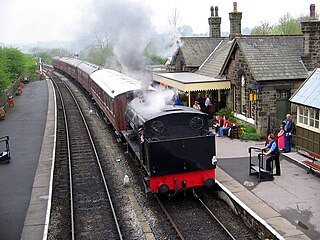
The Embsay and Bolton Abbey Steam Railway (E&BASR) is a heritage railway in North Yorkshire, England, formed in 1979 and opened in 1981.
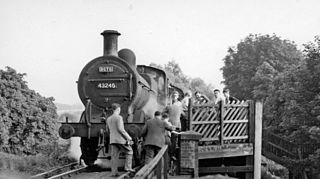
The Nickey line is a disused railway that once linked the towns of Hemel Hempstead and, initially, Luton but later Harpenden via Redbourn, in Hertfordshire, England. The course of most of the railway has been redeveloped as a cycle and walking path, and is part of the Oxford to Welwyn Garden City route of the National Cycle Network. It is approximately nine miles (14 km) long.

The Wharfedale line is one of the rail services in the West Yorkshire Metro area of northern England. The service connects Ilkley with Leeds and Bradford, and is operated by Northern Trains. West Yorkshire Metrocards are available for use on the line, covering Zones 3–5. The line is served predominantly by four-coach Class 333 electric multiple units as well as some three-coach Class 331 EMUs.

Ilkley railway station serves Ilkley in the City of Bradford, West Yorkshire, England. On the Wharfedale Line, it is served by Class 333 electric trains run by Northern Trains, which also manages the station.

Skipton railway station is a Grade II listed station which serves the market town of Skipton in North Yorkshire, England. It is a stop on the Airedale Line, which provides access to destinations such as Leeds, Bradford, Carlisle, Lancaster and Morecambe. The station is operated by Northern Trains and is situated 27 miles (43 km) north-west of Leeds; it is located on Broughton Road.

British Railways Class 505 were 1,500 V DC electric multiple units (EMUs) introduced in 1931 by the Manchester, South Junction and Altrincham Railway (MSJAR). Although assigned to TOPS Class 505 by British Railways, these units were withdrawn before the TOPS numbering system came into common use for multiple units, and the Class 505 designation is very rarely used.

Stanlow and Thornton railway station is located within the Stanlow Refinery in Cheshire, England. It lies on the Hooton–Helsby line with services operated by Northern Trains. The station is surrounded by the refinery site, so as a result most station users are refinery employees. In 2018–19 it was the joint least-used railway station in Britain, tied with Denton in Greater Manchester. In 2020/21, the station was also one of the least used stations in Britain, with 0 entries/exits. Since 3 February 2022 the station has been temporarily closed due to safety concerns of the footbridge which is the only entrypoint to the station.
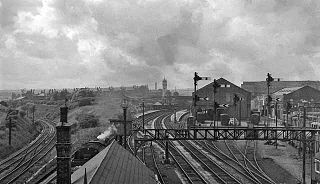
Bury Knowsley Street is a former railway station in Bury.
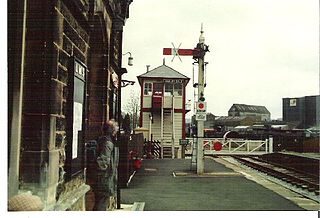
Darley Dale railway station is a railway station on the heritage line Peak Rail.
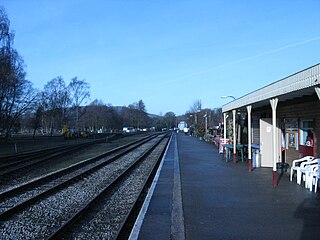
Rowsley South railway station lies approximately a mile short of Rowsley village, the location of the settlement's previous stations. Rowsley South was the third station to be built in the area, constructed by Peak Rail volunteers in the late 1990s.

Grassington & Threshfield railway station was a railway station that served the town of Grassington and village of Threshfield, in North Yorkshire, England.
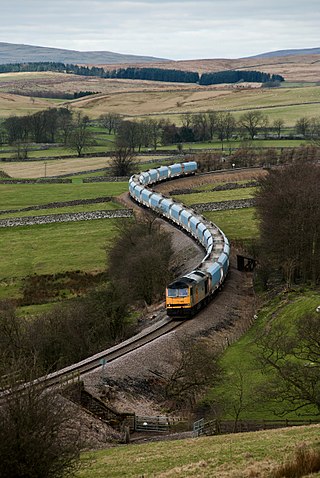
The Yorkshire Dales Railway was a branch line linking the town of Skipton with the villages of Rylstone, Threshfield and Grassington in North Yorkshire, England. There were two stations on the line – Grassington & Threshfield and Rylstone – and a connection via the Skipton to Ilkley Line to Skipton.

Embsay railway station is a railway station on the Embsay and Bolton Abbey Steam Railway. It serves the small village of Embsay in North Yorkshire, England. The station is a terminus on the railway and was re-opened in 1981.

Holywell Halt railway station is on the Embsay and Bolton Abbey Steam Railway in North Yorkshire, England.

Addingham railway station was on the Midland Railway route from Skipton to Ilkley. It served the village of Addingham in West Yorkshire, England.
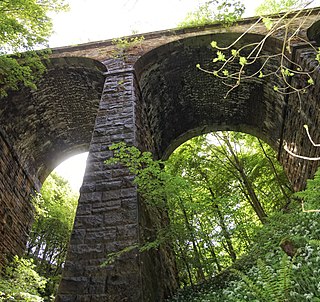
The Skipton–Ilkley line is the route that the Midland Railway took to link the towns of Skipton and Ilkley via the villages of Embsay, Bolton Abbey and Addingham.
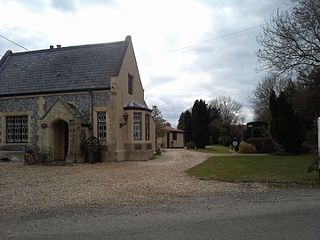
Fransham railway station is a former station in Great Fransham, Norfolk. It was opened as part of the Lynn and Dereham Railway, becoming part of the East Anglian Railway from 1847, on the section of line between Dereham and Swaffham.

Hest Bank railway station was opened by the Lancaster and Carlisle Railway (L&CR) three miles north of Lancaster Castle railway station. The line had been authorised in 1844 and a station was proposed for the village of Hest Bank, Lancashire, the following year. It opened in 1846 along with the line. The station continued to serve the village of Hest Bank until its closure in 1969. The site remains notable as being the point at which the present-day West Coast Main Line (WCML) comes nearest to the west coast. Views of Morecambe Bay can be glimpsed from trains on this section of the line.

Morecambe Euston Road was the terminus station of the London and North Western Railway's branch line to Morecambe, in Lancashire, England. It closed in 1962, after which all trains to Morecambe used the nearby Morecambe Promenade station.

Dyserth railway station served the village of Dyserth, Flintshire, Wales. It was the southern terminus of the 2 miles 70 chains (4.6 km) Dyserth branch, most of which is now a public footpath. At its peak Dyserth had passengers in the thousands. In 1930 the line and station closed for passengers in the face of road competition. At one point fourteen trains a day had shuttled along the line. Although the station has long been demolished, a crane from the station has been installed at the end of the walk as a feature of historical interest, as have two pieces of track at Chapel Street.























